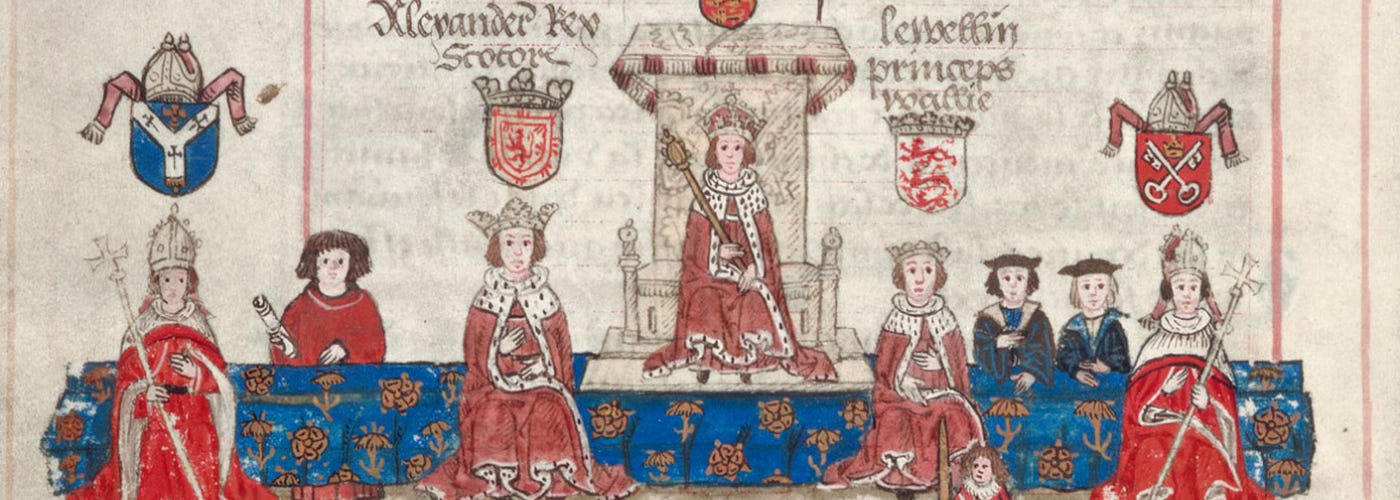Longshanks, the ruthless feudal monarch
Review of A Great and Terrible King: Edward I and the Forging of Britain by Marc Morris
Though there was little about the "forging of Britain" of the subtitle beyond Edward I’s forcible coercion of territories and aristocrats into fealty to him, this book is a fascinating inquiry into the nature of power in the feudal era. In his many constitutional wrangles, Edward I (“Longshanks”) did advance the prospects of constitutional monarchy, however inchoate. The bulk of his accomplishment was the application of iron will in as autocratic a manner as he found possible.
The story starts with his father, Henry III (a grandson of Eleanor of Aquitaine), a weak king who was challenged by his feudal underlings in what amounted to a coup. In 1272, Edward I took over, moving quickly to consolidate power.
First, he undertook the most extensive survey of England since the Domesday Book, which informed him of the issues his subjects faced; in the process, he created contacts far more extensive than his father had done.
Second, he expanded his proto-parliamentary consultations to include many more actors than those in his immediate entourage, reversing the lazy practice of his father to rely exclusively on court loyalists; by taking more of their interests into consideration, he reasoned, they would be more willing to fund him.
Third, he created a tariff system on exports, particularly wool, ensuring a new stream of income.
Fourth, he built links with an Italian bank, Riccardi of Lucca (using the tariff income as collateral), which could provide immediate liquidity in the event of sudden needs. Edward also promised to aid Riccardi to recoup debts owed to the bank by wool merchants.
These represented shrewd and effective innovations, enabling him to aggrandize his territories, virtually end the lawlessness (think Robin Hood) that had overtaken the countryside, and jumpstart the economy in peace. For a time, his system worked extremely well. His greatest accomplishment was perhaps the subjection of Wales in 1283, which had a charismatic military leader in Llywellan ap Gruffudd.
Later in his career, especially once troubles with Philip III of France began over the possession of Gascony, Edward's authoritarian streak emerged, forcing extremely onerous taxes on his subjects in pursuit of unpopular wars. This is where one can see how complex feudal administration might become. Edward was king of England, but in Gascony he was vassal to the King of France under his father's laboriously negotiated treaty and a series of complicated marriage arrangements and promises. He was sworn to defer to the French King rather than resort immediately to force in local disputes, which rubbed him the wrong way to put it mildly. Once a new sovereign took over (Philip III), who made purposely untenable demands, the arrangement broke down, ending a long era of stable peace. The consequences would be terrible.
Eventually, Edward alienated English aristocrats, hugely complicating his political agenda, damaging his reputation with the populace and forcing him to put down a number of challenges to his authority. His finance system then broke down, leading him to break relations with the Italian bankers and in 1290 to expel all Jews from Britain for a one-time financial windfall. In short, perhaps from hubris, he lost his political touch and was forced into a series of concessions that limited his power; this extended the reach of the Magna Carta (negotiated by his grandfather, King John in 1215 as well as the Provisions of Oxford of 1258 by Henry III). Edward was forced to cede such ancient privileges as the "King's forests", a murky area of royal property rights that infringed on the rights of his lords and many others. Historians view his concessions as a major step towards the establishment of a constitutional monarchy based on an independent parliament.
With the succession crisis in Scotland of 1292 – the death of Alexander III that sparked the competition of cousins Robert Bruce and John Balliol for the Scottish crown – Edward sunk himself into an extravagant military quagmire that would dominate the rest of his reign. Though it appeared that he had subdued Scotland on several occasions, the victories were short-lived.
What distinguishes this book is the density and nuance of coverage. With great mastery, Morris explains the details of the issues from the economy to personal politics to feudal custom. If you like this kind of thing, the reading experience is extremely rich, which kept my attention for the entire book. But it is emphatically not for those who are looking for adventure stories; they would find the book dry and hard to follow. The portrait of Edward that emerges is far more subtle than the bad-guy caricature of him in the film Braveheart. The tone is not at all academic, but vivid and precise. This is personal, but I loved the way Morris writes. It left me hungry to dig deeper, a sure sign of the book's success.
Unfortunately, Morris never defines what he means by the "forging of Britain", so I felt that the subtitle of the book was somewhat misleading. In addition, the personal side of Edward was described only in the barest outline. Finally, I did not find the sum-up chapter to sum much of anything up.





This sounds like a good one. I'm told that authors don't always have a voice in what their books are called, but I suppose everything is part of the "forging of Britain" up until it started to decline. Allegedly, one of my maternal grandfather's ancestors married a daughter of Llywellan ap Gryffudd's daughters, but I suppose someone had to. I played snare drum in s Scottish pipe band for a while, and singing, "Flower of Scotland" (which mocks "proud Edward" is a part of every Highland Games, so now that's in my head. Anyhoo, thanks for another great review.